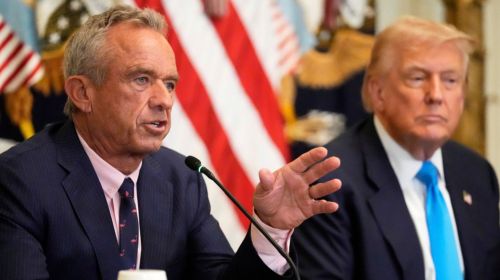

Eugenic thinking has returned to American political life, not through explicit declarations but through language, policy framing, and public health narratives.

By Matthew A. McIntosh
Public Historian
Brewminate
Introduction: Eugenics Returns to the Mainstream
Eugenics was supposed to be a relic, a discredited ideology abandoned after it fueled some of the worst atrocities of the twentieth century. Yet in the first year of Donald Trump’s second term, the language and logic of eugenics have crept back into mainstream political discourse. Trump’s repeated references to having “good genes,” documented across outlets, are part of a wider pattern in which heredity, “fitness,” and biological hierarchy have resurfaced as talking points inside his administration and among his closest political allies. This revival is not theoretical or fringe. Eugenic narratives are increasingly woven into discussions of immigration, disability, public health, and national identity.
The resurgence extends far beyond rhetoric. Trump and RFK Jr. have amplified pseudoscientific claims about autism and disability at high-profile events, including conferences that promoted debunked theories about vaccines, Tylenol, and genetic “damage.” These narratives, which experts have repeatedly rejected, signal a shift toward biological determinism that echoes the foundations of early-twentieth-century eugenic policy. In parallel, eugenicist thinking is re-emerging in federal policy discussions, influencing debates around who is considered “desirable,” “healthy,” or “fit” to be part of the nation.
Public health experts are alarmed. Elements of Trump’s proposed health-policy agenda, particularly efforts to weaken or dismantle public health infrastructure, mirror historical eugenic strategies that weaponized neglect. At the same time, disability advocates and journalists report that disabled people, neurodivergent communities, and those with chronic illnesses are increasingly framed as burdens or political liabilities, signaling a dangerous return to ideas that once justified segregation, forced sterilization, and institutional neglect.
The reporting across these sources shows that eugenics has not reappeared accidentally. It has returned through political messaging, pseudoscientific claims, and policy framing that treat heredity and “genetic worth” as markers of value. What was once confined to the margins has been carried into the center of national conversation, a development with profound consequences for public health, human rights, and the nation’s moral direction.
Trump’s “Good Genes” Narrative and Its Political Function
Trump’s repeated references to having “good genes” have become a defining feature of his public rhetoric in his second term, and the pattern is extensively documented in the reporting. These comments across rallies, interviews, and official appearances, highlight how Trump uses heredity to frame intelligence, leadership, and national strength. These statements are not isolated asides; they are part of a broader worldview that treats genetic inheritance as a marker of superiority, echoing themes historically associated with eugenic ideology.
This rhetoric is placed within a political strategy that elevates biological determinism while sidelining structural explanations for inequality. Trump’s phrasing, particularly when he lauds certain populations for their “strength” or “fitness,” reinforces hierarchical narratives about who is naturally suited to prosperity or leadership. This mirrors classical eugenic arguments that linked success or failure to innate traits rather than social and economic conditions.
The political function of this rhetoric becomes clearer when placed within broader policy conversations. Terms like “good genes” and “strong bloodlines” show up alongside discussions of national regeneration, demographic desirability, and population “improvement,” suggesting a link between Trump’s language and how members of his administration frame issues of immigration, disability, and public health. These ideas are not presented explicitly as eugenics, but their underlying logic, the belief that biological traits determine social value, aligns closely with early twentieth-century eugenic thought.
These narratives play a powerful political role. By appealing to heredity and “genetic advantage,” Trump positions his own family lineage as a marker of legitimacy while normalizing a framework in which worth is tied to biology rather than rights, opportunity, or shared humanity. This form of “soft eugenics” does not call for overt policies like forced sterilization, but it primes the public to accept hierarchies based on supposedly superior traits. In doing so, it lays rhetorical groundwork that makes other eugenic-aligned policies, from immigration restrictions to disability stigmatization, more politically palatable.
RFK Jr., Autism, and Pseudoscience as Policy Influence
The partnership between Trump and RFK Jr. has become a major channel for reintroducing pseudoscientific narratives about autism, disability, and heredity back into national politics. Mother Jones reports extensively on the autism conference jointly promoted by Trump and RFK Jr., where speakers advanced debunked theories linking autism to Tylenol use, vaccines, and other disproven causes. These claims have been rejected by mainstream medical research for decades, yet the event elevated them as if they were legitimate scientific controversies, a move that further embeds biological determinism into federal public health conversation.
At the conference, presenters framed autism not as a neurological variation but as the result of toxic exposures that supposedly “damage” children’s genetic integrity. This language aligns closely with historic eugenic ideas that tied disability to contamination, degeneration, and weakened heredity. While no government policy was formally announced at the event, the presence of high-profile political figures and the administration’s promotion of the gathering signal a willingness to treat these unverified claims as meaningful contributions to health policy discussions.
The conference also marks a significant shift in federal rhetoric. Officials and speakers repeatedly implied that preventing autism requires controlling certain exposures during pregnancy or early childhood, a framing that echoes early twentieth-century eugenic arguments about “protecting” the population by policing parental behavior. These narratives place heavy moral and biological blame on parents, especially mothers, reinforcing stigmas that disability advocates have long worked to dismantle.
Eugenic narratives about autism and disability have been increasingly adopted by figures within the administration and its network of advisers. According to the article, some political actors now describe disability as a “national burden,” echoing rhetoric that once justified segregation and institutionalization. This shift is particularly harmful because it reframes disability not as a civil rights issue but as a policy problem tied to biological “fitness,” making marginalized communities more vulnerable to exclusionary policy proposals.
Pseudoscience has become not just a fringe talking point but a meaningful influence on the administration’s approach to disability and public health. By giving a platform to discredited theories and framing disability through the lens of damage and heredity, Trump and RFK Jr. are helping re-legitimize ideas that disability advocates, medical researchers, and human rights organizations have spent decades pushing out of mainstream discourse. The result is a political environment where eugenic tropes can re-enter policy conversations under the guise of concern for children’s “health” or “genetic well-being.”
Immigration, “Genetic Fitness,” and Racialized Hierarchies
The revival of eugenic thinking is especially visible in how immigration is now framed within parts of Trump’s political ecosystem. Discussions of “desirable” and “undesirable” migrants have re-emerged in policy circles, with rhetoric increasingly oriented around traits such as intelligence, productivity, and biological “fitness.” These conversations mirror early twentieth-century immigration debates, where policymakers used pseudoscientific measurements to justify exclusion based on race, disability, or perceived inferiority. The article documents how certain officials within the administration have echoed these themes, linking national strength to the hereditary traits of those allowed to enter.
This shift is not confined to language alone; it is tied to real policy proposals. Analyses outlines how eugenic frames have reappeared in immigration and demographic policy discussions, including arguments that the United States should prioritize migrants who align with a narrow vision of “genetic health” or “national improvement.” According to the report, this framing appears in statements from political allies who advocate for population policy grounded in hereditarian logic, suggesting that certain groups contribute more to the nation’s “well-being” than others. These claims echo classic eugenic justifications for exclusionary immigration policy.
These ideas intersect with discussions of race, with some political figures tying demographic changes to fears of national decline, a narrative historically used to rationalize discriminatory quotas. The report highlights instances in which immigration is described through the lens of population “quality” rather than law, economics, or humanitarian responsibility. This reframing shifts public debate away from rights and toward biological hierarchies, creating space for policies that implicitly rank human worth by ancestry.
The rhetorical overlap with historic eugenics becomes more alarming when paired with how disability is treated in these immigration conversations. Disabled migrants and those with chronic illnesses are increasingly discussed in terms of burden, productivity, or cost, categories that directly mirror the exclusion criteria of early eugenic immigration laws. By framing disability as a justification for restricting entry, these narratives revive methods once used to enforce racial and ableist hierarchies through federal policy.
The reporting across these sources underscores that what is resurfacing is not a simple debate about border security or economic capacity. It is the revival of an ideological framework that sorts people into categories of value based on heredity, ability, and perceived biological worth. When immigration is framed in these terms, it signals a profound shift in how federal officials understand human rights, national belonging, and the role of government. It is a return to eugenic logic dressed in modern political language.
Disability as a Political Target
Eugenic language has also resurfaced in how disability is discussed within Trump’s political orbit. Several figures in the administration and its allied networks have framed disability as a social and economic “burden,” echoing rhetoric that has historically been used to justify exclusion, segregation, and forced institutionalization. Rather than addressing the systemic barriers that disabled people face, these narratives focus on productivity, dependency, and “cost,” placing disability in a framework rooted in eugenic valuation rather than civil rights.
This shift has been especially visible in discussions around neurodivergence and chronic illness. Disabled people are increasingly portrayed as indicators of national decline, with some political actors using phrases like “healthier population goals” or “preventable burdens” to justify potentially restrictive policies. These framings do not propose overt eugenic actions, but they revive the underlying logic that disability reduces national strength, a central premise of early twentieth-century eugenics.
Some federal policy debates now implicitly link disability to immigration, economic productivity, and demographic “fitness.” By framing access to public resources or participation in society around notions of biological worth, these narratives sidestep the fundamental rights and protections disabled people fought to secure. They also obscure the reality that structural inequities, not genetics, shape most disability-related outcomes in health, employment, and education.
Disability is being repositioned within a political environment increasingly receptive to pseudoscientific ideas about heredity and value. This reframing does not appear in the form of explicit eugenic policy, but rather as a set of narratives that encourage the public to see disability through the lens of deficiency and burden. In doing so, these stories normalize the very assumptions that made past eugenic policies possible and leave disabled communities particularly vulnerable to exclusionary decision-making at the federal level.
Public Health Policies Echoing Eugenic Logic
Trump’s approach to public health has accelerated concerns among experts who warn that certain policy proposals resemble the logic that guided early eugenic programs. Public health professor Craig Spencer draws explicit parallels between the administration’s push to weaken or dismantle public health institutions and the strategies used in past eugenics movements. Spencer warns that cutting or restructuring federal health agencies, including limiting their authority and reducing their capacity to gather population-level data, would disproportionately harm disabled people, chronically ill individuals, and communities already facing systemic health disparities. These actions echo the historical use of neglect and underfunding as a tool to determine whose lives were valued and whose were expendable.
Other reporting further documents how eugenics-aligned thinking is influencing federal discussions about “population health,” a term some political actors now use in ways that prioritize biological narratives over structural determinants like housing, poverty, pollution, or access to care. The article describes how certain administration-aligned figures have embraced rhetoric that ties national well-being to perceived genetic strength, suggesting that illness and disability weaken the country rather than reflect failures in social policy. These claims emerge in debates over pandemic preparedness, reproductive health, and funding for chronic disease programs, all areas where eugenic framings historically took root.
The danger, as these reports emphasize, is not limited to the content of any single policy. It lies in the broader shift away from inclusive, evidence-based public health strategies toward frameworks that treat human value as contingent upon biology. By weakening agencies responsible for disease prevention, data collection, and community health (institutions built to protect the most vulnerable) the administration creates conditions where existing inequalities deepen. Experts fear this approach not only undermines crisis response but also reinscribes hierarchies that view certain populations as less deserving of investment or protection.
These policy orientations are not accidental. They reflect a political environment increasingly shaped by narratives that prioritize heredity, productivity, and “genetic health” over the inclusive principles that have guided public health for decades. In this environment, eugenic logic re-enters through the side door, not as explicit law, but as a set of assumptions shaping how policymakers define health, risk, and worthiness.
Soft Eugenics in the MAGA Political Ecosystem
The broader MAGA movement has become a major conduit for reintroducing eugenic thinking into mainstream conservative discourse. The Guardian’s “MAGA Soft Eugenics” investigation traces how influencers, political commentators, and ideologues in Trump’s orbit have increasingly invoked themes of “genetic decline,” “biological strength,” and “population quality.” According to the reporting, these ideas are often coded rather than explicit, framed in language about revitalization, purity, or “rebuilding” national character. While they avoid overt references to historical eugenics, their underlying assumptions, that some groups intrinsically strengthen the nation while others weaken it, remain the same.
This ecosystem amplifies narratives that connect hereditary traits to civic value. MAGA-aligned think tanks and media personalities regularly promote pseudoscientific claims about intelligence, morality, and productivity being rooted in “good genes.” These narratives are not presented as fringe theories but as cultural commentary woven into discussions of crime, family policy, and national identity. By normalizing these ideas, the movement creates a rhetorical environment where biological hierarchy feels acceptable, even patriotic, rather than a dangerous echo of discredited ideology.
What distinguishes this revival is its subtlety. The Guardian describes this phenomenon as “soft eugenics” precisely because it does not rely on explicit policy demands. Instead, it spreads through cultural messaging, social media networks, and political influencers who frame hereditarian thinking as common sense. These figures often couch their arguments in warnings about “societal decline” or “demographic replacement,” using language that resonates with historical eugenic narratives while avoiding their more overt terminology. This strategy allows eugenic logic to circulate widely without triggering the public backlash associated with the explicit policies of the past.
This messaging is further reinforced by online misinformation. Digital communities tied to MAGA politics have become fertile ground for claims linking disability, chronic illness, or neurodivergence to contamination, irresponsibility, or “genetic weakness.” These narratives spread rapidly on social platforms, where influencers can frame them as concerns about family health, children’s well-being, or national stability. By blending pseudoscience with fear-based messaging, they make eugenic concepts feel aligned with parental anxiety or patriotic duty rather than with discrimination.
Eugenic thinking has re-entered public discourse through a network of cultural actors rather than direct policymaking. This is what makes the resurgence so potent: it does not rely on legislation to take hold. Instead, it gains traction through repeated messaging about heredity, hierarchy, and human worth, messaging amplified across media, rallies, conferences, and online communities within the MAGA movement. This “soft eugenics” does not need to be codified into law to reshape the political landscape; it only needs to become normalized.
Conclusion: An Old Ideology Wearing New Clothes
One reality is unmistakably clear: eugenic thinking has returned to American political life, not through explicit declarations but through language, policy framing, and public health narratives that echo a long-discredited ideology. Ideas once confined to the darkest chapters of U.S. and European history are reappearing in discussions about heredity, disability, immigration, and national identity. They show that what Trump and his allies now promote, from “good genes” rhetoric to pseudoscience about autism, aligns with the core assumptions of eugenics even if the word itself is avoided.
This resurgence poses serious risks because it reframes human worth as a matter of biology rather than rights, opportunity, or justice. When disability is treated as a burden, when immigration is framed around “desirable” traits, when pseudoscientific theories about autism are elevated at federal events, and when public health agencies are weakened in ways that disproportionately harm marginalized communities, the result is a political landscape in which eugenic logic gains legitimacy. As Prism and The Daily Beast report, these trends make disabled people, neurodivergent communities, chronically ill individuals, and racialized groups more vulnerable to exclusionary policies shaped by fear and misinformation rather than evidence and ethics.
Eugenics does not need to return as explicit policy to be dangerous. It returns through the normalization of ideas that rank human lives by perceived biological value. It returns through rhetoric that treats heredity as destiny. It returns when leaders dismiss science and elevate pseudoscience that stigmatizes entire communities. The reporting is unequivocal: this ideology is back, not in the open, but woven into the language and logic of a political movement that increasingly treats human worth as something determined by bloodlines, genetics, or “fitness.” And history has already shown where that road leads.
Originally published by Brewminate, 11.19.2025, under the terms of a Creative Commons Attribution-NonCommercial-NoDerivatives 4.0 International license.


